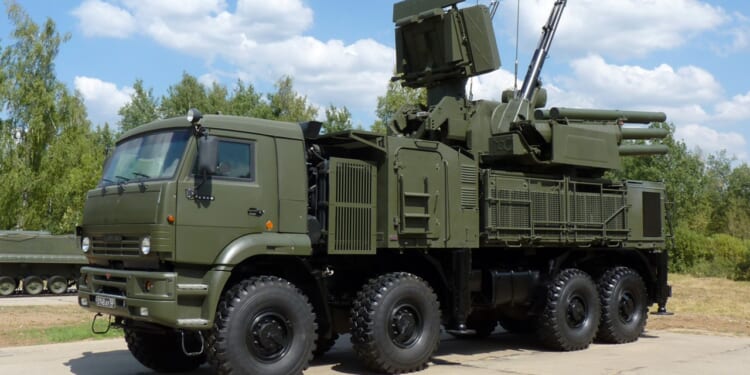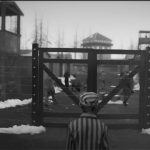Russia’s gift of the Pantsir-S1 to North Korea is a force multiplier for Pyongyang’s already massive air defense posture.
Talk about the horrific gift that keeps on giving every year, all year round. Reports from multiple sources—including Ukraine’s own Defense Intelligence Unit—indicate that Moscow has provided at least one Pantsir-S1 mobile/short-range air defense system to North Korea. South Korean media claims that this Russian system is currently deployed in Pyongyang, guarding the nation’s capital. What’s more, Russian specialists are believed to be currently training North Korean personnel in how to operate the system.
Meanwhile, operational knowledge is being transferred to the North Koreans. After three years of intense combat in Ukraine, the Russians are sharing valuable lessons on air defense, including against drones and advanced cruise missiles of the kind that NATO has gifted to the Ukrainians to use against the Russians fighting in Ukraine.
The transfers between Russia and North Korea are occurring in the context of their growing military alliance. North Korea has supplied Russia with a seemingly endless supply of munitions, manpower, and other logistical support—and possibly even ballistic missiles.
Understanding the Pantsir-S1 Air Defense System
As for North Korea’s air defense needs, the Pantsir-S1 is clearly an upgrade. Historically, Pyongyang has had to rely upon older Soviet-era air defenses such as the SA-2, SA-3, and SA-5, plus indigenous systems of varying capabilities. Many of these are becoming increasingly inadequate in the face of modern drones, precision-guided munitions, and cruise missile threats that have demonstrated remarkable effectiveness in the killing fields of Ukraine.
Acquiring a system like the Pantsir-S1 means that North Korea will possess a more capable short/medium-range air defense weapon than what it currently has, thereby complicating the ability of South Korea to strike back at Pyongyang in the event of a war. The Pantsir-S1 is a mobile, relatively modern, with combined missile and gun system, radar and optical tracking air defense platform.
Remember: air defense is not only about the ability to shoot enemy systems down before hitting your sensitive areas. It is also about coercion. One’s enemies must think that the presence of more advanced air defenses implies that an attack on areas of the country defended by those systems will be more costly to those attackers. And the fear must now arise in the minds of the enemy leadership that, if North Korea possesses these advanced Russian air defense systems, perhaps Pyongyang has also been given more advanced offensive weapons by Moscow. And fears already abound that Russia is helping North Korea advance their submarine force by decades because of their newfound military alliance over the Ukraine War.
While skeptics downplay the significance of just a single Pantsir-S1, the fact remains that North Korea can likely now reverse-engineer the Pantsir-S1 system they’ve received from Moscow, just as they have done with many other Russian and Chinese systems it has been gifted over the decades.
The Pantsir-S1 Could Pose a Real Problem for South Korea
Therefore, Russia’s gift of the Pantsir-S1 to North Korea is a force multiplier for Pyongyang’s already massive air defense posture. It is an asymmetric upgrade that increases the cost to any aggressor for daring to violate North Korea’s airspace. In return, Moscow gains supply, influence, and loyalty, strengthening its global position in the face of Western pressure.
Of course, one system does not fundamentally change the strategic balance overnight on the Korean Peninsula. When integrated with all the other advances that Russia’s continued alliance with North Korea is giving Pyongyang, however, the gift of the Pantsir-S1 means that the balance of military power is shifting slowly in Pyongyang’s favor.
The longer the war lasts, the greater the advances for North Korea’s military posture will become—and the graver the threat to South Korea. This is yet another of the many unforeseen, and unwanted, outcomes of the Ukraine War.
About the Author: Brandon J. Weichert
Brandon J. Weichert is a senior national security editor at The National Interest. Recently, Weichert became the host of The National Security Hour on America Outloud News and iHeartRadio, where he discusses national security policy every Wednesday at 8pm Eastern. He is also a contributor at Popular Mechanics and has consulted regularly with various government institutions and private organizations on geopolitical issues. Weichert’s writings have appeared in multiple publications, including The Washington Times, National Review, The American Spectator, MSN, The Asia Times, and countless others. His books include Winning Space: How America Remains a Superpower, Biohacked: China’s Race to Control Life, and The Shadow War: Iran’s Quest for Supremacy. His newest book, A Disaster of Our Own Making: How the West Lost Ukraine is available for purchase wherever books are sold. He can be followed via Twitter @WeTheBrandon.
Image: Shutterstock / Danila2332.


















